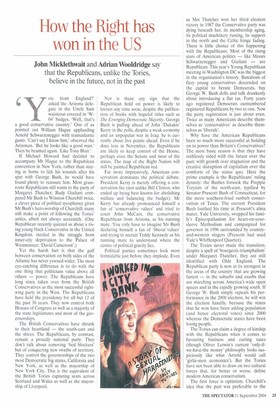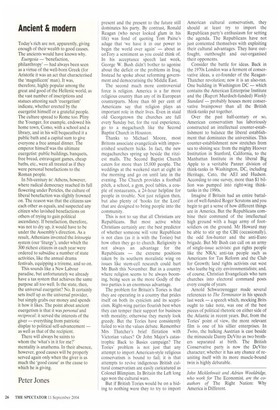How the Right has won in the US
John Micklethwait and Adrian Wooldridge say that the Republicans, unlike the Tories, believe in the future, not in the past c oufrom England?' asked the Arizona delegate in the Uncle Sam waistcoat covered in 'W04 badges. 'Well, that's
a good conservative country.' One of us pointed out William Hague applauding Arnold Schwarzenegger with transatlantic gusto. 'Can't say I know him,' observed the Arizonan. 'But he looks like a good man.' Then he beamed again. 'Like Tony Blair.'
If Michael Howard had decided to accompany Mr Hague to the Republican convention in New York, rather than staying at home to lick his wounds after his spat with George Bush, he would have found plenty to reassure him. Most grassroots Republicans still warm to the party of Margaret Thatcher; Rudy Giuliani compared Mr Bush to Winston Churchill twice, a clever piece of political sycophancy given Mr Bush's hero-worship of Churchill; many still make a point of following the Tories' antics, albeit not always accurately. (One Republican recently quizzed us about a rising young black Conservative in the United Kingdom, steeled in the struggle from inner-city deprivation to the Palace of Westminster: 'David Cameroon'.) Yet the harsh fact is that the gulf between conservatism on both sides of the Atlantic has never yawned wider. The most eye-catching difference is to do with the one thing that politicians value above all others — power. The Republicans have long since taken over from the British Conservatives as the most successful rightwing party in the West. The Republicans have held the presidency for all but 12 of the past 36 years. They now control both Houses of Congress as well as a majority of the state legislatures and most of the governorships.
The British Conservatives have shrunk
to their heartland — the south-cast and the shires. The Republicans, by contrast, remain a proudly national party. They don't talk about removing 'bed blockers' but of conquering new swaths of territory. They control the governorships of the two most Democratic big states, California and New York, as well as the mayorship of New York City. This is the equivalent of the British Tories capturing seats across Scotland and Wales as well as the mayorship of Liverpool.
Nor is there any sign that the Republican hold on power is likely to loosen any time soon, despite the publication of books with hopeful titles such as The Emerging Democratic Majorh y. George Bush is pulling ahead of John 'Dukakis' Kerry in the polls, despite a weak economy and an unpopular war in Iraq: he is currently about five points ahead. Even if he does lose in November. the Republicans are likely to keep control of the House, perhaps even the Senate and most of the states. The map of the Right Nation will still be painted Republican red.
Far more impressively, American conservatism dominates the political debate. President Kerry is merely offering a conservatism lite (not unlike Bill Clinton, who ended up being best known for abolishing welfare and balancing the budget). Mr Kerry has already pronounced himself a fan of 'conservative values' and tried to court John McCain, the conservative Republican from Arizona, as his running mate. You only have to imagine Mr Bush declaring himself a fan of 'liberal values' and trying to recruit Teddy Kennedy as his running mate to understand where the centre of political gravity lies.
Political parties sometimes look most formidable just before they implode. Even as Mrs Thatcher won her third election victory in 1987 the Conservative party was dying beneath her, its membership aging, its political machinery rusting, its support in the north and the Celtic fringe fading. There is little chance of this happening with the Republicans. Most of the rising stars of American politics — like Messrs Schwarzenegger and Giuliani — are Republican. This year's Young Republican meeting in Washington DC was the biggest in the organisation's history. Battalions of fiery young conservatives descended on the capital to berate Democrats, buy George W. Bush dolls and talk drunkenly about introducing a flat tax. Forty years ago registered Democrats outnumbered registered Republicans by two to one, Now the party registration is just about even. Twice as many Americans describe themselves as 'conservatives' as describe themselves as 'liberals'.
Why have the American Republicans been so much more successful at holding on to power than Britain's Conservatives? The most basic reason is that they have ruthlessly sided with the future over the past: with growth over stagnation and the creative disruption of capitalism over the comforts of the status quo. Here the prime example is the Republicans' ruling dynasty: the Bushes forsook the Preppie Toryism of the north-east, typified by Senator Prescott Bush of Connecticut, for the more southern-fried sunbelt conservatism of Texas. The current President Bush loathed his time at Prescott's alma mater, Yale University, swapped his family's Episcopalianism for heart-on-yoursleeve Methodism and campaigned for governor in 1996 surrounded by countryand-western singers (Prescott had used Yale's Whiffenpoof Quartet).
The Tories never made the transition; despite a spell of 'bourgeois triumphalism' under Margaret Thatcher, they are still identified with Olde England. The Republican party is now at its strongest in the areas of the country that are growing fastest — in the suburbs and exurbs that are marching across America's wide open spaces and in the rapidly growing south. If George W. Bush simply repeats his performance in the 2000 election, he will win the election handily, because the states that he won have been adding population (and hence electoral votes) since 2000 whereas the Democratic states have been losing people.
The Tories can claim a degree of kinship with the Republicans when it comes to favouring business and cutting taxes (though Oliver Letwin's current 'only-ifwe-have-the money' philosophy looks suspiciously like what Arnold would call 'girlie-men economics'). But the Tories have not been able to draw on two cultural forces that, for better or worse, define modern American conservatism.
The first force is optimism. Churchill's idea that the past was preferable to the present and the present to the future still dominates his party. By contrast, Ronald Reagan (who never looked glum in his life) was fond of quoting Tom Paine's adage that 'we have it in our power to begin the world over again' — about as unTory a sentiment as you could think of. In his acceptance speech last week, George W. Bush didn't bother to agonise about the deficit or the problems in Iraq. Instead he spoke about reforming government and democratising the Middle East.
The second much more controversial force is religion. America is a far more religious country than any of its European counterparts. More than 60 per cent of Americans say that religion plays an important role in their lives. Even in staid old Georgetown the churches are full every Sunday but, for the real experience, go to a megachurch like the Second Baptist Church in Houston.
Thanks to Michael Moore, most Britons associate evangelicals with impoverished southern hicks, In fact, the new megachurches spring up beside the ritziest malls. The Second Baptist Church caters for more than 15,000 people. The weddings at the weekend start at eight in the morning and go on until late in the evening. The Church provides a football pitch, a school, a gym, pool tables, a couple of restaurants, a 24-hour helpline for people in trouble. Not just religion then, but also plenty of 'hooks for the Lord' that are designed to bring people into the community.
This is not to say that all Christians are Republicans. But most active white Christians certainly are: the best predictor of whether someone will vote Republican is not class (as it is with the Tories) but how often they go to church. Religiosity is not always an advantage for the Republicans — the extreme positions taken by its southern moralistic wing on issues like stem-cell research could hurt Mr Bush this November. But in a country where religion seems to be always booming, being seen as the more Godly of the two parties is an enormous advantage.
The problem for Britain's Tories is that they are operating in a country that prides itself on both its cynicism and its scepticism. Right-wing parties flourish best when they can temper their support for business with morality; otherwise they merely look greedy. But the Tories have consistently failed to win the values debate. Remember Mrs Thatcher's brief flirtation with Victorian values? Or John Major's catastrophic Back to Basics campaign? The Tories' problem is not just that any attempt to import American-style religious conservatism is bound to fail; it is that attempts to revive indigenous British cultural conservatism are easily caricatured as Colonel Blimpism. In Britain the Left long ago won the cultural wars.
But if British Tories would be on a hiding to nothing were they to try to import American cultural conservatism, they should at least try to import the Republican party's enthusiasm for setting the agenda. The Republicans have not just contented themselves with exploiting their cultural advantages. They have outfought, outthought and out-organised their opponents.
Consider the battle for ideas. Back in the 1970s London was a ferment of conservative ideas, a co-founder of the ReaganThatcher revolution; now it is an also-ran. One building in Washington DC — which contains the American Enterprise Institute and the (Rupert Murdoch-funded) Weekly Standard — probably houses more conservative brainpower than all the British think-tanks put together.
Over the past half-century or so, American conservatism has laboriously constructed an intellectual counter-establishment to balance the liberal establishment that dominates the universities. This counter-establishment now stretches from sea to shining sea: from the mighty Hoover Institution in Stanford, California, to the Manhattan Institute in the liberal Big Apple to a veritable Panzer division of think-tanks in Washington, DC, including Heritage, Cato, the AEI and Hudson. According to one survey, more than $1 billion was pumped into right-wing thinktanks in the 1990s.
Imagine if Britain had an entire battalion of well-funded Roger Scrutons and you begin to get a sense of how different things are in America. But the Republicans combine their command of the intellectual high ground with a huge army of footsoldiers on the ground. Mr Howard may be able to stir up the CBI (occasionally), the odd fox-hunter and the anti-Euro brigade. But Mr Bush can call on an army of single-issue activists: gun rights people like the NRA; anti-tax people such as Americans for Tax Reform and the Club for Growth; land rights activists out west who loathe big city environmentalists; and, of course, Christian Evangelicals who turn churches into electoral command posts every couple of years.
Arnold Schwarzenegger made several references to The Terminator in his speech last week — a speech which, mocking Brits ought to take note, was one of the best pieces of political rhetoric on either side of the Atlantic in recent years. But, from the Tories' point of view, the more relevant film is one of his sillier enterprises. In Twins, the hulking Austrian is cast beside the minuscule Danny Dc Vito as two brothers separated at birth. The British Conservative party is now the DeVito character; whether it has any chance of reuniting itself with its more muscle-bound twin is highly debatable.
John Micklethwait and Adrian Wooldridge, who work for The Economist, are the coauthors of The Right Nation: Why America is Different.











































































 Previous page
Previous page